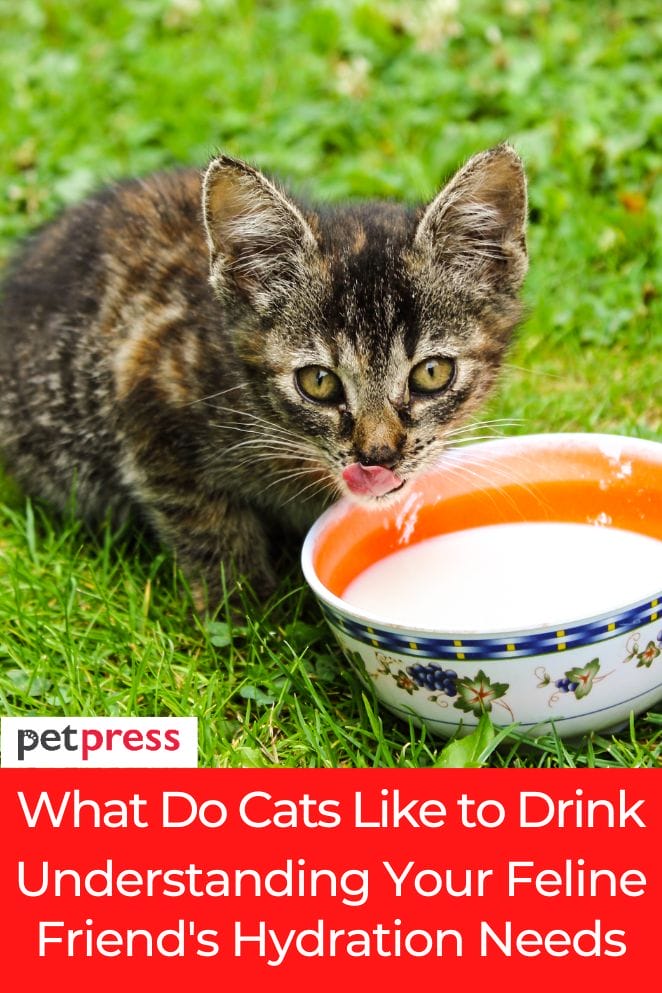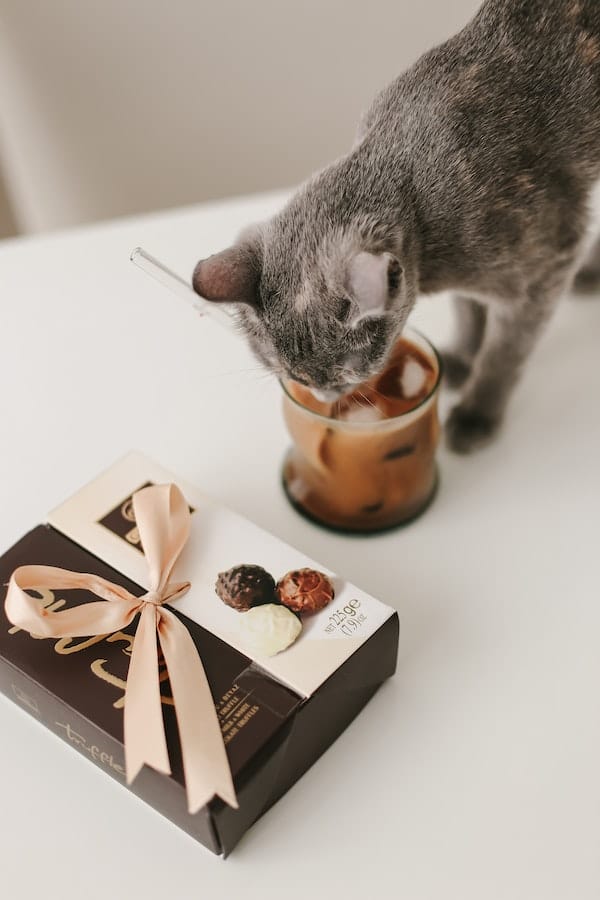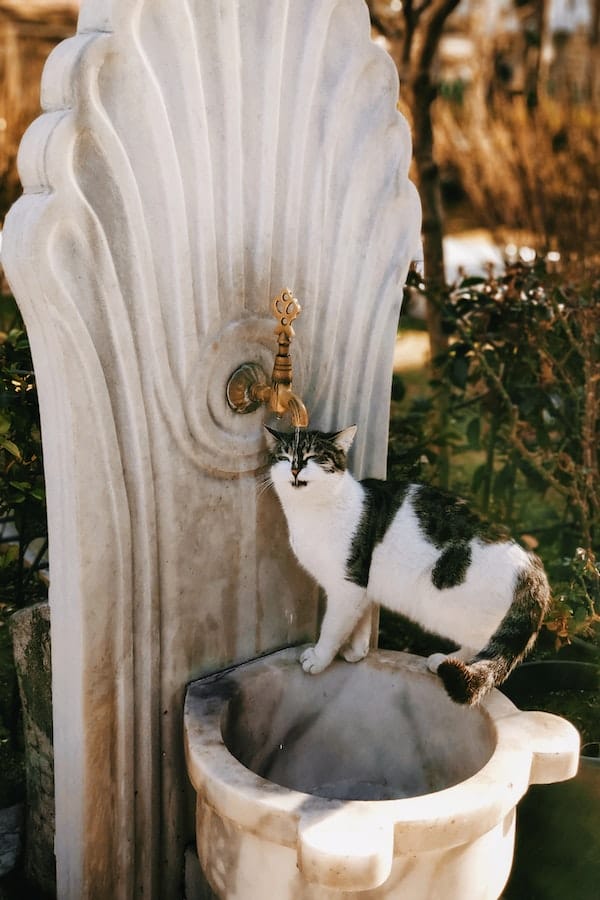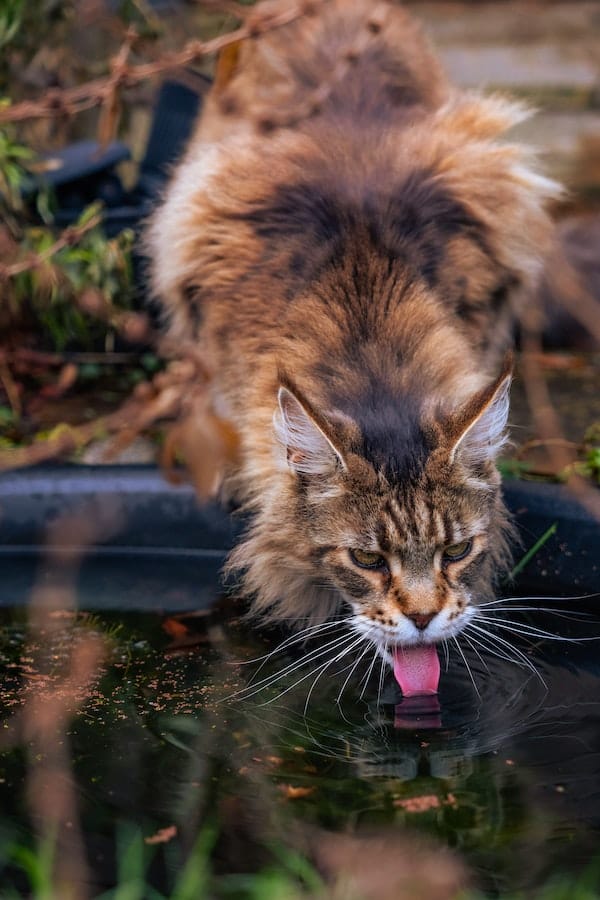
As a dedicated feline caregiver, your primary goal is to provide unparalleled care for your beloved cat.
Among the essential facets of cat care, ensuring optimal hydration for your furry companion stands paramount.
Adequate hydration plays a pivotal role in maintaining your cat’s overall health and well-being.
In the following discourse, we shall delve into an exploration of the myriad beverage choices available to cats, seeking to comprehend their unique hydration requirements for perpetual joy and vitality.
The Importance of Hydration for Cats
Vigilantly attending to our feline friends’ hydration needs is imperative, as it profoundly influences their overall physical and mental health.
Water serves as an indispensable agent in facilitating digestion, regulating body temperature, and ridding systems of harmful toxins.
Furthermore, it upholds the optimal functioning of vital organs such as the kidneys and urinary tract, preserving the felicitous state of our cherished cats.
Water: The Preferred Choice

When it comes to satiating their thirst, water unquestionably reigns supreme as the favored choice for cats.
To ensure your cat maintains sufficient hydration, consider the following factors:
Fresh and Clean Water
Cats are famously particular about their choices, and this includes their preference for water.
They tend to favor fresh and clean water and may show hesitation towards drinking from a stagnant or dirty water source.
Water Bowl Location
To promote regular hydration for your feline companion, consider strategically placing multiple water bowls throughout your home.
Set them in areas where your cat often hangs out or spends time.
Encouraging Water Intake
If your cat seems reluctant to drink water, don’t worry, you can encourage them in a playful way.
Consider using a cat water fountain, as the flowing water tends to catch their curiosity and can entice them to drink more frequently.
Milk and Cats: Myth or Reality?
The iconic image of a cat lapping up milk remains etched in the collective consciousness, but does it align with the reality of feline companionship?
Lactose Intolerance in Cats
Contrary to widespread belief, most adult cats are afflicted with lactose intolerance.
Lacking the essential enzyme to digest lactose—a sugar present in milk—consumption can lead to gastrointestinal distress, including diarrhea and stomach discomfort.
Alternatives to Milk
When looking for a special treat for your cat, consider choosing lactose-free cat milk, specially designed for feline consumption.
It’s a safe and delightful alternative to regular milk, ensuring your furry friend enjoys their little indulgence without any digestive issues.

Cat-Friendly Beverages
Apart from water and milk alternatives, there are other beverages that cats may enjoy:
Catnip Tea
Offering catnip tea to your furry companion can be a delightful experience.
Catnip, a herb known for its ability to stimulate pleasure receptors in cats, may evoke a euphoric reaction in some felines, creating moments of joy and playfulness.
Bone Broth
Introducing bone broth to your cat’s diet can offer a nutritious and hydrating option.
This wholesome liquid not only provides additional nutrients but also promotes hydration, which is essential for your cat’s overall well-being.
Meat or Fish Flavored Water
For some cats, offering water infused with a hint of meat or fish broth can be a tempting way to encourage increased water intake.
The added flavor can pique their interest and make staying hydrated a more enjoyable experience for them.
Water-Rich Cat Foods
In addition to encouraging water intake through beverages, you can also provide water-rich cat foods to help maintain your cat’s hydration levels:
Wet Cat Food Benefits
Wet cat food boasts a high moisture content, serving as a pivotal element in fulfilling your cat’s hydration requisites.
Additionally, it proves more accommodating for certain cats, particularly those grappling with dental afflictions or sensitivities.
Homemade Cat Food Hydration
If you prefer preparing homemade cat food, ensure that it includes water-rich ingredients like lean meat and vegetables.
Homemade meals should be nutritionally balanced and meet your cat’s dietary requirements.

Signs of Dehydration in Cats
As a responsible cat owner, vigilance concerning your cat’s water intake is of utmost importance, as it serves as an invaluable indicator of their well-being:
Monitoring Water Consumption
Maintaining a record of your cat’s daily water intake unveils invaluable insights into potential shifts in their drinking patterns, signaling possible health concerns.
Cats are adept at concealing illness, rendering their water consumption a pivotal determinant of their health.
Dehydration Symptoms
Astute observation of dehydration symptoms proves vital to safeguarding your cat’s welfare.
Look out for dry and sticky gums, sunken eyes, and reduced skin elasticity upon gentle pinching.
Sluggishness and decreased appetite may also hint at dehydration.
Felines are sensitive to alterations in hydration levels, necessitating early detection to prevent complications.
Seeking Veterinary Care
Should any concerns regarding your cat’s health arise, particularly if you suspect dehydration or notice worrisome symptoms, swift recourse to professional veterinary attention is crucial.
Dehydration carries the potential to precipitate severe health complications if left untreated, making timely care essential for your treasured feline companion.

Conclusion
Optimal hydration plays an integral role in safeguarding your cat’s overall health and well-being.
Embracing water as the preferred source of hydration for your feline friend, accompanied by accessible and clean water bowls, ensures their continual refreshment.
While occasional indulgence in catnip tea or bone broth can bring moments of delight, it is best to steer clear of regular milk consumption due to lactose intolerance.
Incorporating water-rich wet cat food into their diet contributes to maintaining their hydration levels and overall health.
Frequently Asked Questions (FAQs)
It’s best to avoid flavored water for cats, as artificial sweeteners and additives may be harmful to their health. Stick to plain, fresh water for hydration.
Ice water may be less appealing to cats, as they prefer room-temperature water. It’s best to provide water at a comfortable temperature for your feline friend.
The water intake varies based on a cat’s size, age, and diet. On average, a cat should drink around 3.5 to 4.5 ounces of water per 5 pounds of body weight per day.
Some cats enjoy drinking from a running faucet as the moving water may be more enticing. Providing a cat water fountain can mimic this effect.
If your cat consistently avoids drinking water, consult with a veterinarian to rule out any underlying health issues and discuss strategies to encourage hydration.
- Does Cat Litter Melt Ice? The Complete Guide to Winter Safety - January 30, 2026
- Happy Tail Dogs: Understanding This Common Canine Condition - January 29, 2026
- How Cold Can Outdoor Cats Handle? Feline Winter Safety - January 27, 2026


GIPHY App Key not set. Please check settings